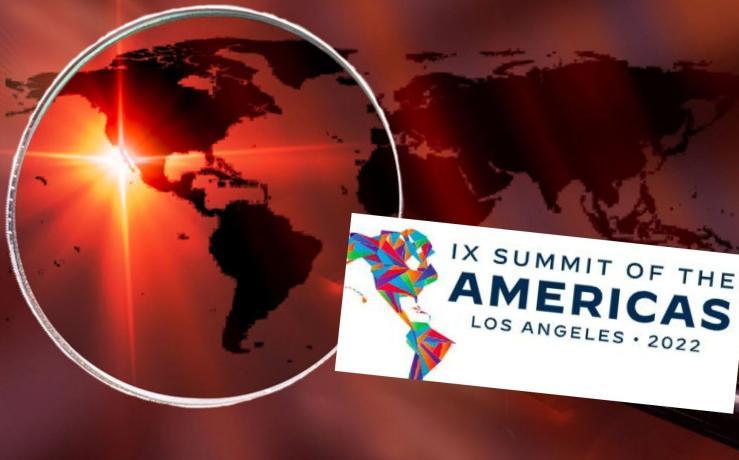IX Summit of the Americas. From the Pandemic to Ukraine.

The ninth summit of the Americas, which brings together all the presidents of the continent, will take place from 6 to 10 June in Los Angeles. Washington’s real priority is to reach an “immigration pact”.
It is a political initiative conceived during the Clinton administration to accompany the process of economic integration, which its predecessor, Bush senior, had proposed as “a free trade zone from Alaska
to Tierra del Fuego.”
The first of these meetings took place in Miami in 1994; the next was in Santiago de Chile (1998), the third in Quebec, Canada (2001), and the fourth in Mar del Plata, Argentina (2005) – in which Néstor Kirchner, president of Argentina, strongly criticized Bush Jr. and the US continental free trade project; these were followed by the fifth summit in Port of Spain in Trinidad and Tobago (2009), the sixth in Cartagena in Colombia (2012), chaired by Obama, like the previous one, the seventh summit held in Panama (2015) and the last one in Lima (2018).
The pandemic disrupted the meetings, which normally took place every three years. Now, the holding of the 9th Summit – the second to be held in the United States – is seen by US Secretary of State Antony Blinken as a tool to revive relations with Latin America, which lost priority during the first year and a half of Biden’s mandate, which has been accentuated in recent months by the war in Ukraine.
The theme with which the summit was convened is “Building a sustainable, resilient and equitable future”. But Washington’s real priority is to reach an “immigration pact”. The climate crisis, the transition to clean energy, equitable economic growth and the role of civil society and independent media complete the agenda.
On May 2, the Undersecretary of the State Department for Latin America and the Caribbean, Brian Nicholls, announced that Cuba, Nicaragua and Venezuela will not be invited because “they do not respect the democratic charter”. The Democratic Charter is an instrument signed by the governments of the continent more than three decades ago and is a reference point for the institutional crises that have occurred in the region since then.
For Washington, these three countries do not fulfil the requirements of the Democratic Charter. Furthermore, in the face of the Ukrainian crisis, all three countries have adopted pro-Moscow positions. They are also the three countries in the region that have expressed their readiness to accept a permanent Russian military presence in their respective territories. For his part, Mexican President Manuel López Obrador asked Biden to invite “all peoples of the Americas”.
Meanwhile, Biden has appointed his two special advisers to the summit: former Senator Christopher Dodd and former Ecuadorian-born MP Debbie Mucarsel-Powell. The former served on the Senate Foreign Relations Committee for 28 years with President Biden, while the latter is known to support Venezuelan refugees leaving their country, seeking temporary security status, immigration protection, and work permits.
This meeting comes as the immigration issue becomes more complicated for the Biden administration, which is working with most of the decisions Trump made to implement a drastic policy against illegal immigration. Proposals to ease or eliminate these policies, which were at the heart of the Democratic left-wing campaign, did not materialize.
The situation in Central America complicates this problem. Transit to the southern US border through Central America continues to be the main entry point for illegal immigration. The new governments of Honduras and Costa Rica show ties to the Venezuelan regime that their predecessors did not have. The El Salvador government, meanwhile, has turned to China in the face of Washington’s criticism of its authoritarianism. At the same time, the State Department opened an official channel to receive corruption complaints concerning the six Central American countries, which deteriorated its relations
with Washington.
But the war in Ukraine is the US priority. The exclusion of Cuba, Nicaragua and Venezuela, as mentioned, is linked to the pro-Moscow positions expressed by these countries. A month after the invasion, on March 24, the UN vote calling on Russia to cease hostilities was supported by all but the three countries in the region, as well as by Bolivia and El Salvador.
In other words, 29 of the 34 countries in Latin America and the Caribbean agreed with the position of Washington and the EU. But when the exclusion of Russia from the UN Human Rights Council was voted on April 4, Brazil and Mexico – as well as other regional powers such as Egypt, Nigeria, Saudi Arabia and Indonesia – abstained, not supporting the vote of the United States.
At the meeting of G20 finance ministers on April 20, Argentina, Mexico and Brazil followed the position of the majority of the group not to exclude Russia or to boycott its minister’s speech. In the vote of the Organization of American States (OSA) on April 21 to suspend Moscow as an observer of the organization, which prevailed with 23 votes, Mexico, Brazil and Argentina abstained.
Thirteen non-NATO countries attended the NATO and Allied Summit in Ramstein, Germany on April 26: four from Africa, two from Asia, and none from Latin America and the Caribbean. (Photo: 123rf.com)
Rosendo Fraga/Nueva Mayoría



